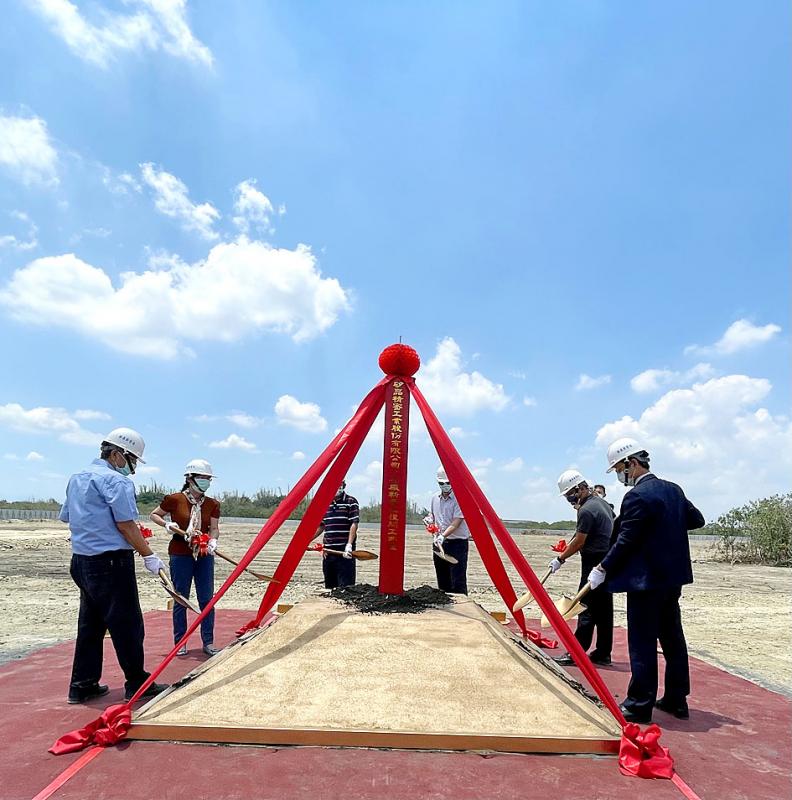Chip testing and packaging company Siliconware Precision Industries Co (SPIL, 矽品精密) yesterday said it plans to invest NT$80 billion (US$2.86 billion) to build a new plant in Changhua County’s Erlin Township (二林).
SPIL is investing in new capacity as 5G-related applications and an expanding stay-at-home economy have boosted demand for chip testing and packaging services, and to ease persistent constraints in the semiconductor supply chain.
A subsidiary of ASE Technology Holding Co (日月光投控), SPIL said in a statement that the first phase of the construction would be completed next year.

Photo courtesy of Siliconware Precision Industries Co
“The plant’s groundbreaking today is just the first of a series of capacity expansions,” SPIL chairman Tsai Chi-wen (蔡祺文) said in the statement.
The Erlin plant would be a major base providing high-end chip testing and packaging services. It should help SPIL fend off growing competition in the wake of capacity buildup in the US and Europe to reduce dependence on Asia, Taiwan in particular, for semiconductors, the statement said.
The new plant would create 7,500 jobs after reaching full capacity in the next eight to 10 years, the statement said.
It would occupy 14.5 hectares, three times larger than its existing plant in the county.
ASE is the world’s biggest supplier of chip testing and packaging services.
The Kaohsiung-based company told investors last month that a supply-demand imbalance continues to affect the whole semiconductor chain.
“That is why many of our customers have signed long-term agreements,” ASE said at the time.
Taiwan’s chip testing and packaging services providers are forecast to see production value grow 8.28 percent to NT$575.2 billion this year, compared with last year’s NT$531.2 billion, the Market Intelligence and Consulting Institute (MIC, 資策會) said yesterday.
Overall, Taiwan’s semiconductor industry is to grow its production value at an annual pace of 11.4 percent this year to NT$3.26 trillion.
MIC attributed the growth to strong demand for notebook computers, high-performance computing devices, automotive electronics and Internet-of-things products.

South Korea’s equity benchmark yesterday crossed a new milestone just a month after surpassing the once-unthinkable 5,000 mark as surging global memory demand powers the country’s biggest chipmakers. The KOSPI advanced as much as 2.6 percent to a record 6,123, with Samsung Electronics Co and SK Hynix Inc each gaining more than 2 percent. With the benchmark now up 45 percent this year, South Korea’s stock market capitalization has also moved past France’s, following last month’s overtaking of Germany’s. Long overlooked by foreign funds, despite being undervalued, South Korean stocks have now emerged as clear winners in the global market. The so-called “artificial intelligence

Chinese artificial intelligence (AI) start-up DeepSeek’s (深度求索) latest AI model, set to be released as soon as next week, was trained on Nvidia Corp’s most advanced AI chip, the Blackwell, a senior official of US President Donald Trump’s administration said on Monday, in what could represent a violation of US export controls. The US believes DeepSeek will remove the technical indicators that might reveal its use of American AI chips, the official said, adding that the Blackwells are likely clustered at its data center in Inner Mongolia, an autonomous region of China. The person declined to say how the US government received

‘SEISMIC SHIFT’: The researcher forecast there would be about 1.1 billion mobile shipments this year, down from 1.26 billion the prior year and erasing years of gains The global smartphone market is expected to contract 12.9 percent this year due to the unprecedented memorychip shortage, marking “a crisis like no other,” researcher International Data Corp (IDC) said. The new forecast, a dramatic revision down from earlier estimates, gives the latest accounting of the ongoing memory crunch that is affecting every corner of the electronics industry. The demand for advanced memory to power artificial intelligence (AI) tasks has drained global supply until well into next year and jeopardizes the business model of many smartphone makers. IDC forecast about 1.1 billion mobile shipments this year, down from 1.26 billion the prior

FORTUNES REVERSED: The new 15 percent levies left countries with a 10 percent tariff worse off and stripped away the advantage of those with a 15 percent rate In a swift reversal of fortunes, countries that had been hardest hit by US President Donald Trump’s tariffs have emerged as the biggest winners from the US Supreme Court’s decision to strike down his emergency levies. China, India and Brazil are among those now seeing lower tariff rates for shipments to the US after the court ruled Trump’s use of the International Emergency Economic Powers Act to impose duties was illegal. While Trump subsequently announced plans for a 15 percent global rate, Bloomberg Economics said that would mean an average effective tariff rate of about 12 percent — the lowest since